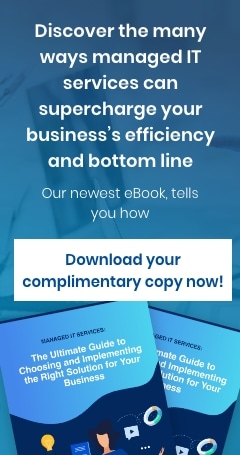Although the benefits of cloud computing for small businesses are indispensable, the technology has also introduced a raft of new security concerns and challenges. As more and more businesses move data between their local network and remote data centers, there’s now an entirely new avenue for hackers to exploit.
Cloud providers have a certain amount of responsibility to secure these channels, but business owners don’t get off scot-free. If you subscribe to cloud services, you need to be aware of the risks and the questions you should be asking your provider.
This week, we’ve compiled some common security concerns regarding the cloud and provided some tips on how to mitigate them:
#1. Account hijacking
One of the greatest benefits of cloud computing is also its most serious drawback. On one hand, the ability to access corporate resources from any device connected to the internet is extremely convenient for today’s mobile workforce. On the other hand, it adds an entirely new cyber threat to worry about, since anyone with the right login credentials can access your data.
Online accounts have long been a favorite target of social engineering scammers who rely on duping victims into spelling out their username or password in an email or phone call. Oftentimes, there isn’t a single line of malicious code involved, so human ignorance is far more to blame than shortcomings in technology. The only ways to mitigate the risk is through proper staff training and 24/7 data monitoring.
#2. Advanced persistent threats
Many cyberattacks are carried out en masse, since they can still be profitable even if less than 1% of targets become victims. However, some of the most dangerous attacks are carried out by skilled and patient hackers who target a specific victim using stealthy and drawn-out procedures. These are advanced persistent threats, or APTs, which are designed to blend in with legitimate traffic.
APTs are most often carried out against specific targets, such as government entities and businesses of all sizes. Since they vary widely and are extremely complicated in nature, they’re also the toughest to guard against. To mitigate the impact of APTs, organizations need proactive cybersecurity controls, including round-the-clock monitoring, white-hat penetration testing, and rigid access controls to cloud-hosted resources.
#3. Insecure application programming interfaces
Every organization has a unique set of needs when it comes time to migrate to the cloud, which is why no two cloud infrastructures look the same. Cloud vendors sometimes provide application programming interfaces (APIs) to let their clients customize solutions and integrate their legacy line-of-business applications. However, these can contain serious security vulnerabilities that hackers may exploit.
Since APIs are used for integrating, managing, and monitoring cloud services, it’s imperative that you make ongoing, proactive API security testing an integral part of your cloud-migration strategy. A dependable cloud provider should be able to take care of this for you by ensuring that your data is always encrypted and that your APIs cannot be modified by unauthorized parties.
#4. Denial of service attacks
Although denial-of-service (DoS) attacks don’t involve the theft of confidential data, they do have disastrous consequences for their victims. Distributed denial-of-service attacks are the most common cyber attacks, and are designed to bring down a target’s network. These attacks may be carried out by hacktivists, foreign governments, or even unscrupulous competitors.
DoS attacks work by bombarding servers, such as those hosting your cloud apps, with requests until they either crash or slow down dramatically. In some cases, they may even be used to divert attention away from more serious attacks, such as APTs (#2 on this list). Fortunately, any reputable cloud provider should have a robust DoS response plan, as well as redundant servers to fall back on should the primary become unavailable.
Online Computers provides IT services to companies around Northern New Jersey. If you’re looking for a technology provider and consultancy firm you can depend on, call us today to schedule your first free assessment.
Like This Article?
Sign up below and once a month we'll send you a roundup of our most popular posts




